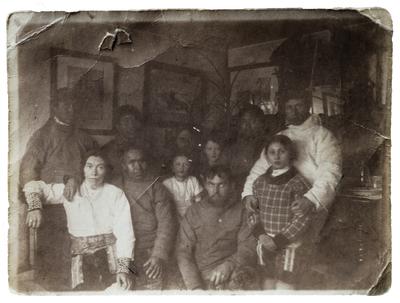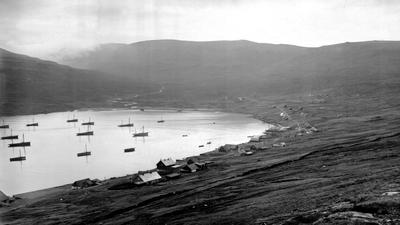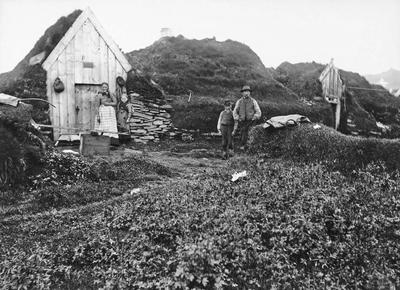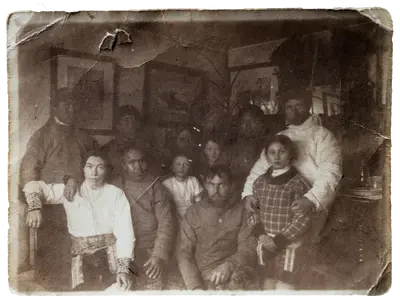Participants
Individual Project Descriptions

Vernacular Affects
Ikerasak, Greenland
Christian Vium
Based on fieldwork and research in the settlement of Ikerasak (approximately 250 inhabitants) located in the Uummannaq Fjord in northwestern Greenland, this project portrays local histories through oral narratives and the analysis of vernacular photographs in close collaboration with the local population. The project is conducted in cooperation with the museum in Uummannaq through workshops and a local exhibition that combines a selection of private archives and stories with the museum’s records from Ikerasak and its surroundings. The emphasis lies on the 20th and 21st centuries, with a particular focus on the settlement’s transition from a so-called outpost, the collective struggle against the closure of the settlement in the 1960s, and how the residents of the settlement collectively turned challenges into creating today’s well-functioning village, which now has its own fish factory and trading station, shop, kindergarten, school, and nursing home. In recent decades, the challenge has been the outmigration of young people to larger cities, which is also addressed in this sub-project.

Intergenerational Dialogues
Tvøroyri, Faroe Islands
Jeanette Lykkegård
Based on fieldwork in and around the settlement of Tvøroyri (with just under 900 inhabitants) on the southernmost of the 18 Faroese islands, this project investigates how local history weaves into contemporary everyday life. A collaboration with Tvøroyrar Skjalasavn, a local archive and museum, highlights the past through historical sources. Through participation in everyday life, qualitative interviews and workshops, as well as the creation of film and audio as dialogic tools, an intergenerational conversation is initiated about the significance of the sea, the landscape, and history for the experience of life in Tvøroyri. In collaboration with Tvøroyrar Skjalasavn, these dialogues are brought into workshops and a local exhibition. Historically, there will be a particular focus on the significance of Tvøroyri originally being established as a trading station for the Royal Danish Trade Monopoly, after which the village developed into an important administrative centre with a large fishing industry. The collaboration with Tvøroyrar Skjalasavn will, among other things, highlight the village’s struggle against marginalisation and inclusion in the post-war period, as well as the resulting economic and industrial restructuring and the transformations this has brought to local everyday life in the village.

Collaborative Collages
Ísafjörður, Iceland
Peter Kærgaard Andersen
Through fieldwork in and around the settlement of Ísafjörður (population 2,700) in northwest Iceland, this project incorporates local archival material, vernacular archives, and oral histories to explore the multifaceted connections between memory, place, history, and nature. Considering Ísafjörður’s history as a trading post and its role in the fishing industry, the project examines how everyday life is shaped by both human and non-human expressions and agencies, such as weather, landscapes, and animal life that contribute to the narratives of place and life stories. Through interviews, local workshops, and multimodal experimentation, the project adopts assemblage as a collaborative, narrative, and affective method to bring together diverse stories and relationships across time, portraying the settlement as a diverse and collectively created place. Material developed through the fieldwork will form the basis of exhibitions at Byggðasafn Vestfjarða (the Westfjords Heritage Museum) and later at the National Museum of Iceland, reflecting on how aesthetics and exhibition-making can contribute to ongoing conversations and reflections on local and national histories.
Researchers
Christian Vium
Associate Professor
Department of Anthropology, Aarhus University
Aarhus, Denmark
Christian Vium (b. 1980) is Associate Professor in Anthropology at Aarhus University and honorary curator at Moesgaard Museum (DK). Working on long-term projects anchored in participatory methods and in-depth collaboration, he investigates the intersection between art, documentary, and the social sciences. In addition to film and photography, he works increasingly with large-scale immersive installations integrating photography, films, sound, and archive material. His work has been exhibited in 40+ exhibitions.
Vium is Principal Investigator on the research projects ‘Revisioning the African City from the Periphery’ (Independent Research Foundation Denmark, 2024-2028) and ‘Everyday Stories’ (Velux Foundation, 2024-2027). He is finalizing his 20-year research project on irregular migration from Africa to Europe, ‘Departed’, on a Monograph Fellowship from the Carlsberg Foundation. His tripartite monograph ‘Revisited’, will be published in 2025 by SPECTOR books, Leipzig. In 2023-24, he was Associated Research Fellow at the Film Studies Center, Harvard University (US) and part of the CPH:LAB incubator for experimentation and collaboration in creative, cross-disciplinary partnerships across film, the creative arts, science, technology and social entrepreneurship. Christian Vium is a FOAM Talent 2015, Lensculture Emerging Talent 2015 Grant Winner, and is on the Critical Mass 2015 list. In 2016, he received the Prix HSBC pour la Photographie. He is the recipient of the 2024 Reminders Photography Stronghold Grant, was nominated for the 2024 Leica Oscar Barnack Award, and shortlisted for the BMW ART MAKERS grant 2024.
Jeanette Lykkegård
Postdoctoral Fellow
Department of Anthropology, Aarhus University
Aarhus, Denmark
Jeanette Lykkegård (b. 1981) holds a PhD in anthropology from Aarhus University. She has explored existential questions about meaningfulness and belonging, and how the experience of time, including past, present and future imaginings may play into this. She is particularly interested in those parts of human life which may be explored in the in-between-ness of our existence. The in-between of humans and other beings, living or dead, and in between humans and their surrounding milieu; the landscape, sounds, animals, and materials more broadly. Her research interests have been highly inspired by her PhD fieldwork among the Chukchi in Northern Kamchatka, and their animist way of experiencing life.
Lykkegård is a Postdoctoral Fellow in the research project ‘Everyday Histories’ at the Department of Anthropology, Aarhus University. During her PhD work, she was affiliated with EPICENTER – Centre for cultural epidemics (Aarhus University) and the research project ‘Death, Materiality and the Origin of Time’ (Aarhus University). During her PhD, she was a visiting scholar at Scot Polar Institute, Cambridge University. Since then, she has been a postdoc in the project ‘Materialities of Home’ (Velux Foundation, 2020-24). Lykkegård experiments with a combination of text, photography, sound, video and other materials in her research methods as well as dissemination. She has had an ongoing collaboration with Moesgaard Museum since 2011 and has contributed with her work to various research-based exhibitions and events there. Most recently (2023-2024) her work with Ukrainian refugees in Denmark, has been exhibited at Museum Sønderjylland, Sønderborg slot.
Peter Kærgaard Andersen
Postdoctoral Fellow
Department of Anthropology, Aarhus University
Aarhus, Denmark
Peter Kærgaard Andersen (b. 1988) is an interdisciplinary researcher whose work blends artistic practice, participatory and socially engaged methodologies with thinking across post- and environmental humanities. Often drawing on situated and concrete encounters with communities, landscapes and archives, his research relates aesthetic and poetic experimentation to topics such as place, belonging, memory, time, technology and mobility. Using a range of new media apparatuses, including filmmaking, textiles, and photography, his work merges human and more-than-human perspectives.
Andersen is a Postdoctoral Fellow in the research project ‘Everyday Histories’ at the Department of Anthropology, Aarhus University. He holds a PhD in Digital Humanities from the University of Genova (2022). Recently, he has been an artist-in-residence in the EU S+T+ARTS initiative, MUSAE (2023-2024), where he explored collaborations between art, science, and technology within the food sector. He has also lately served as a fellow in project ARTéCHO (2023-2024) and as an artist-in-residence at Art Center Rønnebæksholm as part of the ‘Communities in the Garden’ project. Andersen’s work has been widely exhibited and screened at numerous cultural and research institutions.
Advisory Board
Kirsten Hastrup
Professor Emeritus
Department of Anthropology
University of Copenhagen
Copenhagen, Denmark
Mette Sandbye
Professor
Department of Arts and Cultural Studies
University of Copenhagen
Copenhagen, Denmark
Kirsten Thisted
Associate Professor
Department of Cross-Cultural and Regional Studies
University of Copenhagen
Copenhagen, Denmark
Affiliated Researchers
Marianne Holm Pedersen
Senior Researcher
Royal Danish Library
Copenhagen, Denmark
Anne Mette Randrup Jørgensen
Director
Danish Arctic Institute
Copenhagen, Denmark
Partners
Helga Vollertsen
Curator of Ethnology
National Museum of Iceland
Reykjavik, Iceland
Jóna Símonía Bjarnadóttir
Director
Byggðasafn Vestfjarða
Ísafjörður, Iceland
Kristina Djurhuus Christiansen
Curator
Faroe Islands National Museum
Tórshavn, Faroe Islands
Kári Jespersen
Director
Tvøroyrar bygda- og sjóvinnusavn
Tvøroyri, Faroe Islands
Siri Andreasen
Director
Tvøroyrar skjalasavn
Tvøroyri, Faroe Islands
Carina Jerimiassen
Clerk
Uummaannaaq Museum
Uummaannaaq, Greenland
